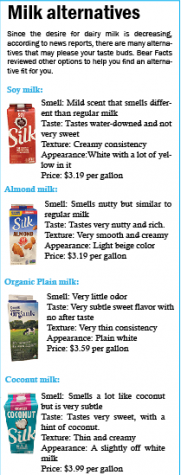Got milk?
Milk doesn’t have everyone a-moo-sed
What did one dairy cow say to another? Got milk! Unlike cows, not all of LZs ‘got milk’ on their minds.
“America has fallen out of love with drinking milk, as lower-calorie options have proliferated and people are substituting water bottles for milk cartons,” according to Time Magazine. In fact, 72.7 percent of students say they drink milk according to Bear Facts Students Media survey of 365 students.
David Nolan, senior is an avid fan of milk and says he can drink, “between 3-6 glasses of chocolate milk a day.”

“I drink chocolate milk because it’s a good snack and I really like the taste of it, Nolan said. “It’s also somewhat healthy, which is good too.”
Milk is known for providing calcium that assists our bones in getting stronger. According to health.clevelandclinic.org, “Milk and dairy products are concentrated calcium sources, and we know calcium fortifies bones and prevents osteoporosis.”
“The recommendation that we get calcium from our diet is just that, it’s a recommendation. We can get calcium from a lot of other sources. So it’s not a matter of being against milk, it’s just understanding that there’s a lot of other ways to get calcium in our diet,” Lily Garcia, health and physical education teacher said. “[For example] my coconut milk yogurt has 35% of my calcium for the day rather than a dairy product,” Garcia said.
That’s good news for people like Anna Yoon, junior, who dislikes cow’s milk because of her lactose intolerance and the taste of it.
“As a kid my mom used to make me drink milk all the time, but now I only drink almond or soy milk because it tastes better and doesn’t make me sick,” Yoon said.
Garcia also says digestive issues from cow’s milk can be something milk drinkers don’t even know they suffer from.
“I think that until somebody tries to stop having dairy, they don’t even know how many health effects they might have from it,” Garcia said. “Some people might have digestive upsets. Dairy really isn’t a substance that a lot of people can tolerate. It might just take time for them to realize that eliminating dairy products might solve some of their issues.”
Cow milk consumption has been decreasing in the United States, and sales have “plummeted 40 percent since 1975,” according to www.statista.com.
“I think some of it might have to do with concerns about how cows are actually treated. Some of its humanitarian concern and also environmental concerns,” Garcia said. “There’s just the preference to have a more plant-based diet, which is really gaining a lot of traction around the country.”

As a sophomore, this is Kayla’s first year on staff but second year in the journalism program. In addition to working for Bear Facts, Kayla also participates...
